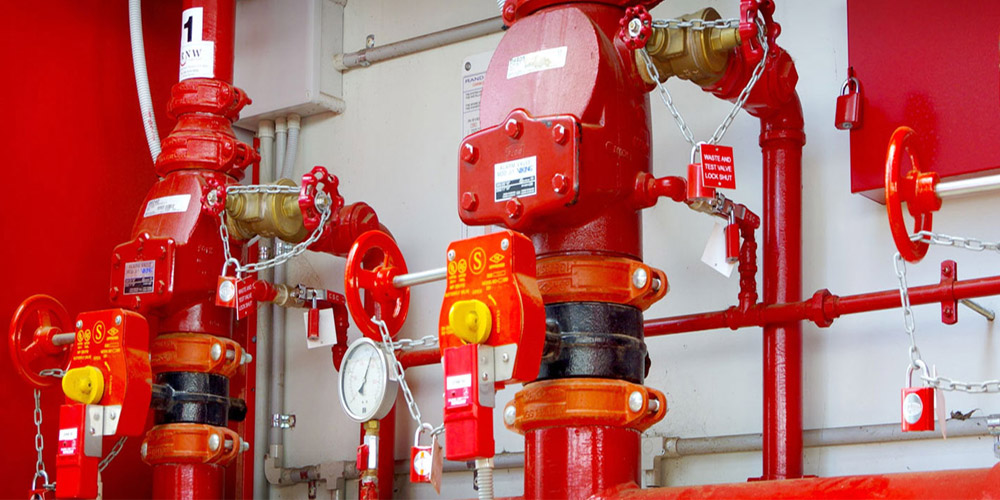Marine fire fighting & fire suppression systems are essential safeguards for maritime operations. Vessels face significant risks from fires due to their unique operational environment — confined spaces, flammable materials, electrical systems, and limited escape routes make onboard fires extremely dangerous. Engine rooms, control rooms, generator rooms, and tanker compartments present constant hazards that require proactive solutions.
Atlas Technologies Corporation delivers advanced marine fire fighting & fire suppression systems designed to detect, contain, and extinguish fires before they escalate, ensuring crew safety, operational continuity, and compliance with safety regulations.
Understanding Marine Fire Risks
The maritime industry faces diverse fire risks, from mechanical failures to fuel leaks and electrical faults. Engine rooms are particularly vulnerable due to high heat and flammable fluids. Control rooms contain sensitive electronic equipment that can trigger fires if systems malfunction. Tankers carrying flammable liquids are especially at risk, with fires potentially leading to catastrophic environmental and safety consequences.
Marine fire fighting & fire suppression systems address these dangers by offering rapid detection and response. They help prevent small incidents from becoming major disasters, safeguarding vessels, crews, and cargo.
What Are Marine Fire Suppression Systems?
Marine fire suppression systems are engineered safety solutions designed for vessels and offshore structures. These systems integrate advanced detection mechanisms with powerful suppression technology, ensuring fires are controlled quickly and efficiently. A well-designed system minimizes fire damage, reduces downtime, and enhances operational safety.
A comprehensive marine fire suppression system works alongside fire detection technology, ensuring immediate action. This integration allows automatic activation of suppression measures while alerting the crew for coordinated firefighting.
Types of Marine Fire Suppression Systems
Water Mist Systems: Water mist fire suppression systems are highly effective for engine rooms, accommodation areas, and enclosed spaces. They use ultra-fine water droplets to absorb heat, cool the fire, and displace oxygen, effectively suppressing flames with minimal water usage. These systems reduce water damage compared to traditional sprinklers while ensuring safety.
Gas-Based Systems: Gas-based suppression systems such as FM-200, CO₂, and Inergen are ideal for protecting sensitive equipment rooms, control areas, and machinery spaces. These systems work by reducing oxygen levels or interrupting chemical reactions that fuel fires. Their residue-free nature ensures minimal damage to equipment while providing fast suppression.
Foam Systems: Foam suppression systems are widely used in tankers, offshore platforms, and vessels carrying flammable liquids. They work by forming a barrier between fuel and oxygen, suppressing vapors and extinguishing fires effectively. Foam systems are particularly suited for hydrocarbon-based fires.
Dry Chemical Systems: Dry chemical suppression systems rapidly interrupt the chemical reaction of fires. These systems are suited for high-risk areas such as engine rooms, fuel storage, and industrial machinery spaces where quick intervention is critical.
A comparative understanding of these systems allows operators to select the best solution tailored to their vessel type, cargo, and operational requirements.
Benefits of Installing Marine Fire Suppression Systems
Marine fire fighting & fire suppression systems deliver substantial advantages for maritime safety and operations.
Rapid Detection and Response – These systems detect fires at the earliest stage and suppress them before they escalate, reducing damage and risk to personnel.
Protection of Personnel – Automated suppression systems enhance crew safety by controlling fires quickly, allowing safe evacuation if needed.
Asset and Cargo Protection – Effective suppression minimizes damage to valuable cargo, onboard equipment, and the vessel structure.
Regulatory Compliance – Marine fire suppression systems are designed to meet international safety regulations such as SOLAS (Safety of Life at Sea) and IMO (International Maritime Organization) requirements.
Operational Continuity – Rapid suppression and early detection help reduce downtime, ensuring vessels can return to service quickly.
Choosing the Right Marine Fire Suppression System
Selecting the right marine fire fighting & fire suppression system requires a comprehensive risk assessment of the vessel. Factors such as vessel type, cargo nature, operational environment, and compliance requirements play a significant role.
Atlas Technologies Corporation offers tailored fire suppression solutions based on detailed analysis. Their experts evaluate the specific fire risks and recommend systems that balance efficiency, compliance, and cost-effectiveness. A customized system ensures maximum protection while meeting SOLAS and IMO regulations.
Maintenance, Testing & Crew Training
A fire suppression system’s effectiveness depends on proper maintenance and crew preparedness. Regular inspection, testing, and certification ensure the system operates optimally during emergencies.
Atlas Technologies provides maintenance programs that include:
- Scheduled inspections and testing of suppression systems.
- Fire alarm and detector testing to ensure reliability.
- Replacement of worn components.
Crew training is equally vital. Fire drills, emergency response simulations, and equipment operation training prepare crews to respond effectively. Atlas Technologies offers tailored training programs to ensure crew readiness for maritime fire incidents.
Takeaway
Marine fire fighting & fire suppression systems are not optional for safe maritime operations — they are essential. Fires at sea present unique challenges that demand specialized solutions. Atlas Technologies Corporation offers advanced systems designed to meet these challenges, ensuring safety for vessels, crews, and cargo while maintaining compliance with global standards.
Investing in the right marine fire suppression system, backed by regular maintenance and crew training, is key to safeguarding your operations. Atlas Technologies stands as a trusted partner in delivering these solutions, ensuring peace of mind and operational resilience.
FAQ
1. What is a marine fire fighting & fire suppression system?
It is an integrated safety system designed to detect, control, and extinguish fires on ships and offshore structures, using specialized suppression technology tailored to maritime environments.
2. How do water mist suppression systems work?
Water mist systems release fine droplets that cool flames, displace oxygen, and absorb heat, extinguishing fires quickly while minimizing water damage.
3. Why are gas-based systems used for marine fire safety?
Gas-based systems suppress fires without leaving residue, making them ideal for sensitive equipment spaces and reducing downtime.
4. How often should marine fire suppression systems be tested?
Regular inspection and testing should follow the manufacturer’s recommendations and comply with SOLAS and IMO standards, often involving annual checks and periodic drills.
5. How does Atlas Technologies support marine fire safety compliance?
Atlas Technologies offers custom-designed fire suppression systems, risk assessments, installation services, maintenance, and crew training to ensure vessels meet all international maritime safety regulations.















